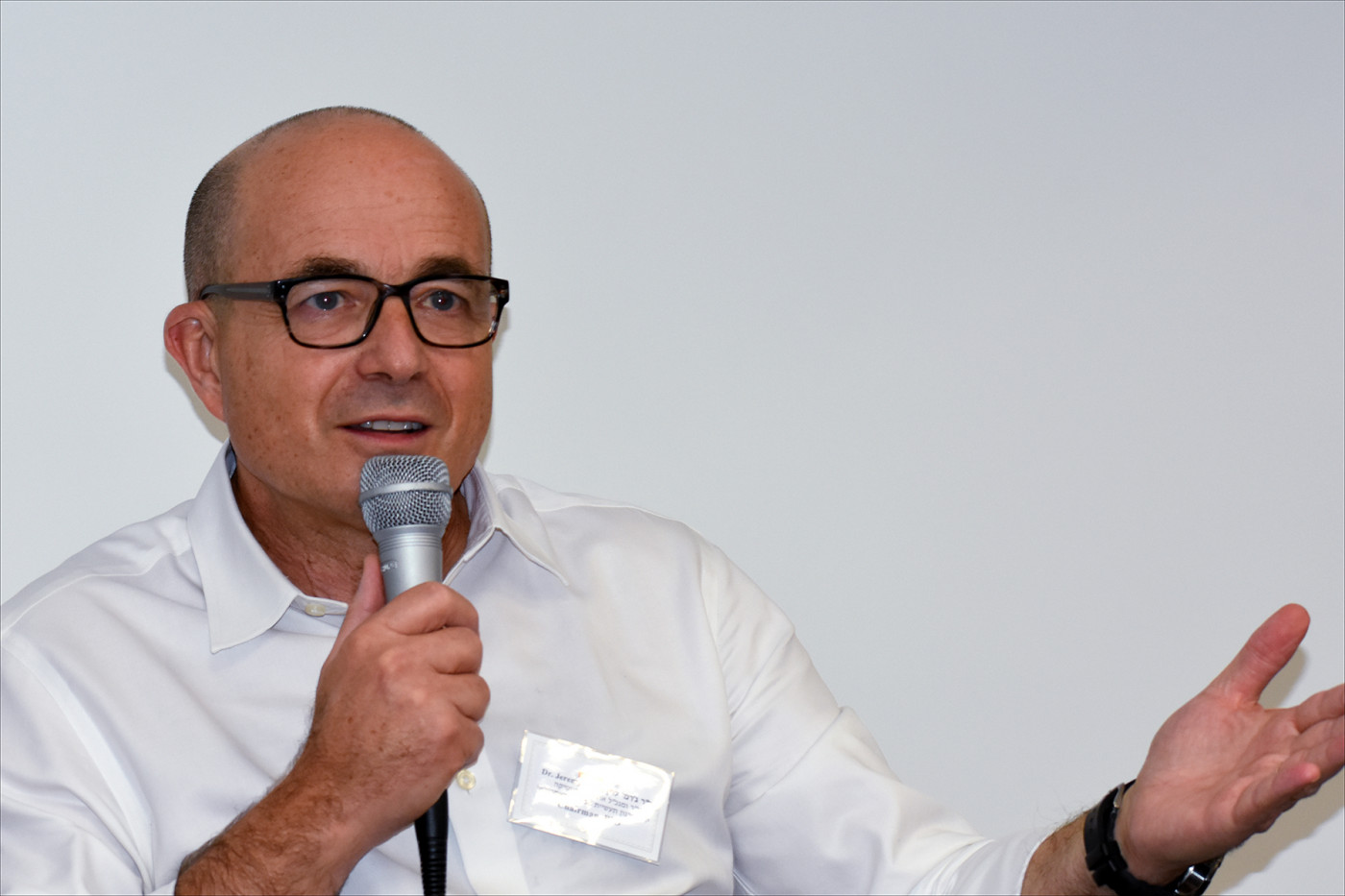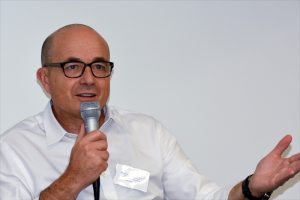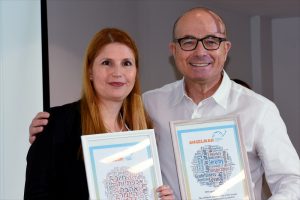Ovid CEO Has High Hopes for OV101 to Treat Angelman Worldwide

Ovid CEO Jeremy Levin speaks Dec. 5 in Tel Aviv at the annual meeting of the Israel Angelman Syndrome Foundation. (Photos by Larry Luxner)
Pharmaceutical industry leader Jeremy Levin believes his company is on the cusp of winning approval for the first medicine that treats the underlying cause of Angelman syndrome.
Levin is CEO of New York-based Ovid Therapeutics, a publicly traded company that’s poured a good chunk of its resources into a single experimental medicine: OV101 (gaboxadol).
Before taking the helm at Ovid, Levin spent two years as president and CEO of Israel’s Teva Pharmaceuticals, one of the world’s largest generic drugmakers. He also chairs the Biotechnology Innovation Organization (BIO), a trade association representing more than 1,000 biotech companies, academic institutions, government agencies, and related entities in 30 countries.
“I’m one of the smallest companies in BIO, but I can tell you the president of the United States knows about Angelman, and so does [Speaker of the House] Nancy Pelosi,” he said. “Why? Because I forced it down their throats.”
Levin, 66, was born in South Africa, grew up in Rhodesia (present-day Zimbabwe), studied in the U.K., and lived for a time in Israel. He now resides in New York.
“The progress that has been made in Angelman over the last few years is remarkable. It’s just stunning,” Levin said recently at a gathering hosted by Israel’s Sheba Medical Center at Tel Hashomer for parents of Angelman children. “Until recently, not one company believed you could develop a therapy for Angelman. Every time I spoke to a venture capitalist, they made me go away. So I said ‘Enough. We’re going to do it ourselves.’ All the money I got from Teva went into Ovid. And I put my family’s money into it. I didn’t wait for venture capital.”
Positive results in clinical trials
Levin, estimating that Ovid has invested around $100 million in OV101, insisted that for himself, “it’s not about money, it’s about making a difference.”
The experimental therapy is a small molecule derived from muscimol, a compound naturally found in mushrooms.
Results from the recently completed Phase 2 study (NCT02996305) — also known as the STARS trial — showed that OV101 improved the clinical global impression involvement (CGI-I) score as well as sleep, behavior, and motor abilities in adolescents and adults with Angelman. Ten of the 78 patients who completed STARS were in Israel; the remaining 68 were seen at 12 clinical sites throughout the United States.
Ovid’s positive results with OV101 in 2018 led the company to launch its pivotal Phase 3 NEPTUNE trial (NCT04106557) involving up to 90 children, ages 2–12, over a 12-week period. Last September, the company announced it had randomized its first patient, with top-line data from the trial to be available in mid-2020.
The coronavirus pandemic has slowed clinical trials for pharmaceutical companies across a wide spectrum of rare diseases. Nevertheless, NEPTUNE is currently recruiting, and Levin hopes that by year’s end, OV101 will win approval from the U.S. Food and Drug Administration (FDA) as the first therapy to treat Angelman syndrome.
“And then, as others come, you’ll be able to layer it on, combine them, and offer real options,” he said. “This is the beauty of OV101. It’s a simple pill, once a day. Many other therapeutics are complex, but they also hold great potential. We need to explore them, even though they’re not in the clinic yet. But they do show effects on animals.”
Designed to fix tonic inhibition
Levin spoke at Sheba Medical Center because it’s home to the first specialized Angelman clinic outside North America to be accredited by the Chicago-based Angelman Syndrome Foundation. The clinic, run by Israeli pediatric neurologist Gali Heimer, now ranks as the fourth-largest Angelman clinic in the world, after two clinics in the U.S. and one in the Netherlands.
Levin said his company believes that one of the core underlying symptoms in Angelman is an inability to distinguish between a signal and random noise.
“Imagine not being able to tell the difference between someone touching your hand and someone slapping it,” Levin said. “Imagine a whisper sounding like a shout. Imagine a smell turning into something unpleasant, a little taste suddenly filling your mouth. This is controlled by a special physiological process in your brain called tonic inhibition. In Angelman, it affects every single brain cell. The question for us is, can we fix that?”
He added: “We bought this drug from another company. They had it on a shelf. It was doing nothing. But they didn’t understand their drug. We decided we’d work with Angelman, because its mechanism of action could fix tonic inhibition if you could only get the dose right. That’s why we ran the STARS trial.”
After consulting with the FDA, Ovid launched its NEPTUNE trial.
“My guess is that if we’re successful, we will never again have to do a trial on adults or adolescents,” Levin said. “We will take all that data to the FDA and ask that they approve it. If it works, then we’ll really go for it.”
Long-term prospects for OV101
After the trial’s 12-week treatment period, those who received OV101 will be compared statistically against those who didn’t, using an endpoint called the CGI-I-AS severity scale.
“You don’t know, and you shouldn’t know, which child gets the medicine and which doesn’t,” Levin said. “I apologize for that, but it’s the only way we can have a real scientific measure. Nobody knows — not even the doctor giving it to your kid. We have to do it this way.”
Levin said he plans to ask the FDA to approve OV101 for Angelman patients of any age.
“We picked 49 [years of age] only because it was a number. In the medicine world, it means an adult. So anybody up to 70 or 80 could get it,” he said, adding that unlike in Israel — where virtually all Angelman patients are known to the community — the situation in the U.S. is quite different.
“Many of the families have abandoned their kids years ago in long-term facilities. We believe there are thousands of adults in such facilities who have a diagnosis of Angelman. It will be very difficult, but we’ll find them, even if it takes two or three years,” Levin said.
The high cost of treating rare-disease patients in general isn’t lost on Levin, who estimates that antisense oligonucleotides for other diseases such as Duchenne muscular dystrophy and spinal muscular atrophy now cost around $300,000 a year.
“Don’t for a minute imagine that our pill taken once a night will even come close to that,” he said, noting that the United States is home to 23,000 known Angelman patients — and possibly closer to 40,000. “We will get well-rewarded for our investment, but we will not exploit patients under any circumstances.”










